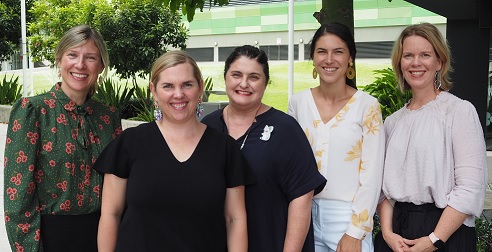A new telehealth program is partnering with families in Queensland’s far south west to access specialist-level diagnostic child development services (CDS) closer to home.
The e-CDS program connects rural and remote families and their local health practitioners with clinicians from the Queensland Children’s Hospital in Brisbane. This family-centred program is a coordinated by the Queensland Child and Youth Clinical Network (QCYCN) in partnership with Children’s Health Queensland Hospital and Health Services’ Child Development Program, with South West Hospital and Health Service (SWHHS) as the first rural location.
Despite being more developmentally vulnerable, children in Queensland’s rural and remote areas often have very limited access to specialist CDS. Dr Kerri-Lyn Webb, Developmental Paediatrician and Chair of the QCYCN, said the e-CDS aims to address this need by bringing specialist paediatric and developmental support into some of the state’s most isolated areas through telehealth.
‘It allows us to bridge the geographical divide through telehealth and bring specialists, local clinicians and families together in a single consultation to more effectively support children and young people with complex developmental needs,’ Dr Webb said.

Jennifer Lancaster, Louise Van Every, Dr Kerri-Lyn Webb, Hannah Christensen, Jordana Rigby
A pilot of the e-CDS program has been running in two towns in Queensland’s remote south west region since October 2019 and has revealed positive results.
Hannah Christensen, e-CDS pilot coordinator, said: ‘In just four clinics, we’ve eliminated the need for around 3,300 kilometres—or about 177 hours—of travel for families who require this level of integrated service.’ ‘Using telehealth means we can reach families in a timely way who may have otherwise faced significant barriers to accessing vital diagnostic CDS. This is evident as all families have attended their appointments so far,’ she added.
The e-CDS team consists of a developmental paediatrician, social worker and psychologist—specialists that are often difficult to access locally. In partnership with local clinicians, the e-CDS team aims to empower families to ask questions, make informed choices and set appropriate goals to support the best-possible developmental outcomes for their children. After an initial appointment, one mother said: ‘I feel like a breath of fresh air has come over me… to hear from a professional what I was thinking.’
‘When diagnosis occurs early, and the right supports are put in place, children and young people have a better chance at reaching their developmental potential,’ Dr Webb said.
As well as improving patient outcomes, rural and remote health services are also benefiting from the program.
Ms Christensen said: ‘The e-CDS program is four times cheaper than employing just one specialist locally while still providing access to expertise for the community.’ ‘We envisage the e-CDS will complement the existing paediatric services in local communities and reduce wait times for families as it has done for SWHHS.’
The program also provides an opportunity to share child development knowledge and improve partnerships between health services. Sally Gordon, a community nurse from Charleville who was new to working in the area of child development before commencing with e-CDS, said: ‘It is very exciting to have our local children have access to such experienced clinicians. Hopefully we will continue to see our local children thrive from the outcomes into the future.’
The e-CDS program hopes to expand to other rural areas of Queensland so more families can benefit.
More information
Email the QCYCN for more information about e-CDS.
Keep up to date with Clinical Excellence Queensland:
- subscribe to our mailing list
- follow us on Twitter, Facebook or Instagram.